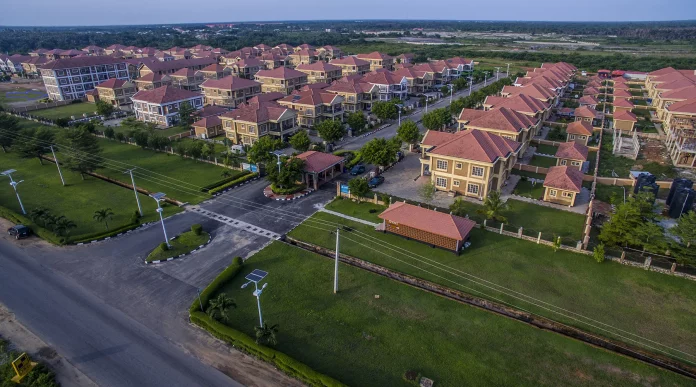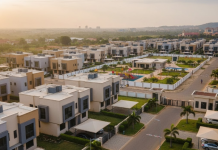City dwellers in Nigeria are facing an unprecedented housing crisis as macroeconomic pressures push rental prices beyond reach. Over the past year, rents in major commercial hubs have surged by 100 percent, exacerbating an already dire situation in a country grappling with a 28-million-unit housing deficit in the affordable segment.
Despite efforts by both the government and private sector, housing supply remains critically low, with fewer than 100,000 new units built annually. The construction industry is slowing down due to high borrowing costs, foreign exchange volatility, and inadequate infrastructure, further deepening the crisis.
Inflation and Escalating Housing Costs
Inflation has driven up the cost of building materials, limiting homeownership and inflating property prices. Rising construction expenses have forced developers to increase home prices to maintain profitability, while landlords hike rents to cover soaring maintenance costs. These challenges stem from fluctuating exchange rates, fiscal policies, and political instability, making housing increasingly unaffordable.
In major cities like Lagos, Abuja, Kano, Ibadan, and Port Harcourt, renters struggle to secure housing as the national minimum wage of ₦70,000 falls far short of meeting basic living expenses. Over the past year, rental costs have more than doubled in many urban centers.
- Lagos: A two-bedroom apartment that once cost ₦500,000–₦700,000 now ranges from ₦1.2 million to ₦1.5 million, while three-bedroom units have jumped from ₦800,000–₦1 million to between ₦1.5 million and ₦2.5 million.
- Abuja: A four-bedroom duplex rents for as high as ₦15 million, a three-bedroom for ₦6 million, and a two-bedroom for ₦5 million–₦12 million.
- Port Harcourt: A two-bedroom flat now costs ₦2 million–₦3.5 million, while a mini-flat ranges from ₦500,000 to ₦600,000.
- Akure: Rents have increased from ₦400,000 to ₦500,000, forcing some tenants to move to cheaper areas where rents range from ₦300,000 to ₦350,000.
With affordability declining, many urban residents are relocating to the outskirts in search of cheaper rents. Others who remain in cities now spend over 70 percent of their income on housing, straining their ability to afford essentials like food, healthcare, and education.
Rent Control and Market Exploitation
Attempts to regulate the rental market through the proposed Rent Control Law have stalled, leaving landlords free to exploit high demand. Many property owners raise rents arbitrarily without making improvements, justifying their actions by pointing to the new minimum wage. However, rising maintenance and living costs make these hikes inevitable.
“Housing costs have surged beyond normal,” said property manager Stephen Sobo. “A three-bedroom flat that once rented for ₦1.5 million now goes for ₦2.5 million–₦3 million. Buying a five-bedroom duplex now requires ₦240 million, while a studio apartment sells for ₦55 million.”
The growing demand from millennials and Gen Z has further pressured the market. Many young professionals are shifting to hybrid work models and seeking affordable studio or one-bedroom apartments, which landlords capitalize on by raising rents.
The Need for Sustainable Solutions
Experts argue that uncontrolled migration to urban centers, combined with insufficient housing supply, is fueling the crisis. Dr. Sunday Olajide, past chairman of the Nigerian Institution of Estate Surveyors and Valuers (NIESV) Ekiti branch, describes the situation as “housing poverty.” Many residents, unable to afford rent, resort to building substandard homes in suburban areas.
While some landlords struggle to find tenants due to high rent demands, others profit from desperate renters. The belief that unregulated agents inflate rents persists, though trained professionals insist they operate within ethical guidelines.
Olajide emphasizes that civil servants cannot afford the current rental rates and should be able to build homes within two years if conditions were favorable. However, with only private developers investing in housing, government intervention remains crucial.
“The government should treat housing as a social service and provide subsidies,” he said. “Rent control won’t work in cities like Lagos, Abuja, and Port Harcourt, where economic conditions remain stagnant. Without proactive policies to curb inflation and ease the cost of living, affordable housing will remain out of reach.”
The Future of Nigeria’s Housing Market
According to Niyi Fayoju, former chairman of the NIESV Real Estate Consulting Division, inflation, rising construction costs, and high demand are the main drivers of skyrocketing rents. Without decisive action, housing will become increasingly unaffordable, pushing more Nigerians into financial hardship or forcing them out of urban centers altogether.
As the crisis deepens, the need for government-backed affordable housing projects, improved infrastructure, and economic stability has never been greater. Until then, many Nigerians will continue to struggle with rising rents and dwindling purchasing power in an increasingly inaccessible housing market.
News source: The Guardian









